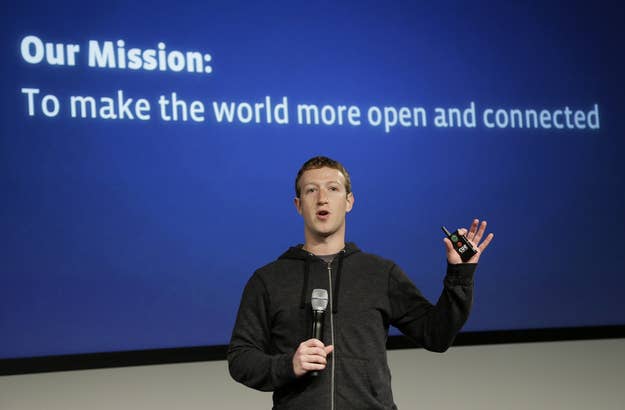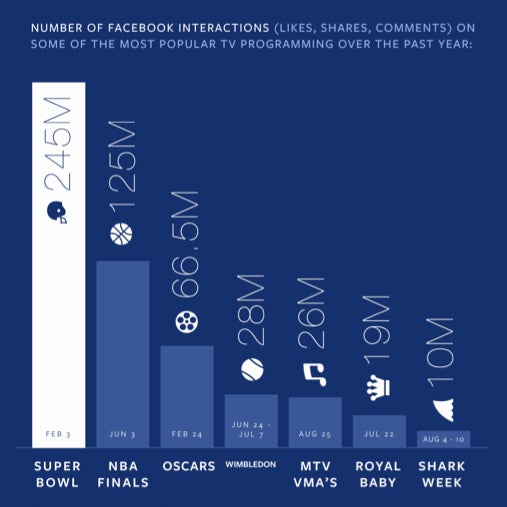
Last year, Facebook spent a lot of time and energy making the case that it should be a publicly traded company. This year, Facebook is making a new case: That its users' data is ready to go public, too.
The gist of this new campaign is that Facebook, not Twitter, is home to the most important real-time conversations on the internet. This is counterintuitive for most people who use both services, and Facebook knows it. To whatever extent that there are important and centralized real-time "conversations" about news, politics and entertainment online, they seem to exist on Twitter.
This utility endeared Twitter the to media, and to a certain type of user — it's the place you go to keep up with a breaking news event, or to follow along with whatever's happening on TV. For power users, it's a soapbox. For other users, it's a way to feel nearer to the main-line conversation even if you're not strictly part of it. Your posts are published into the same public stream as anyone else's, and at least have a shot of going viral. Even if they're not seen by many people, they're published with the understanding — and hope — that they might. You can think of it as an aspirational service. It simulates mobility in a way that Facebook doesn't.
Facebook wants to change these perceptions. So it released some stats:


To a typical user, boasting about the size of Facebook's "conversation" might seem a little bit weird — it's like a cellphone carrier bragging about how many texts were sent during the game, or how many minutes of calling it enables every night; it's like Netflix boasting about how many minutes of content its users watch every weekend. After all, most people use Facebook with some assumption of privacy; its a place to share things between friends, not a broadcast medium. Whether or not this perception warranted (it probably is) or totally accurate (it's not) is irrelevant — it has been fostered by Facebook for years, and it exists.
If any phrase has defined the Facebook experience of the start, it's between friends. But now there's the new Facebook experience, according to Facebook:
Over the past few months, we have rolled out a series of products aimed at surfacing the public conversations happening on Facebook including hashtags, embedded posts, and trending topics. We are committed to building features that improve the experience of discovering and participating in conversations about things happening in the world right now, including entertainment, sports, politics and news.It then announced a plan to share certain trend data with news organizations, including BuzzFeed.
Here's the thing: this is not what Facebook users signed up for, and not how they expected their data to be used. In a vacuum, being able to "discover" conversations on Facebook sounds like a nice feature. In the real world, where it's your data being "surfaced" so that it can be "discovered" by others, it's more fraught. There is an enormous difference between a Facebook post, or conversation, that is technically public but only ever seen by its participants and their friends, and a conversation that will be publicly searchable, or added to a trending topic page. Facebook is gerrymandering its millions of public-yet-private conversations into a single public one.
This is illustrative of an informal law of social media: data you submit to an internet company tends to become more, not less, public over time. And the result is often transformative. Sometimes the transformation is subtle and inoffensive — I doubt many users are going to upset about anonymized Google-Trends-style data aggregation. Other times, the change is more apparent. When Facebook rolled out a new Timeline feature, users across the internet panicked, assuming their private messages had been made public.

What really happened was a near-total shift in context. Conversations that were held in public on Facebook walls five years ago were conducted with different expectations: of audience, of Facebook's general privacy, of long-term recoverability. They were "public," in the legal, terms-of-service sense, and could come back to haunt you. But practically, they were held in a small room, among friends. They felt like private messages. Last year their data, to borrow Facebook's terminology, hadn't been exposed, it had merely been surfaced. But it didn't feel like there was much of a difference between the two. (Imagine if Twitter started actively re-promoting tweets you posted years ago. They're technically public, which you always knew, but trust me — you'd be annoyed, and might feel betrayed.)
With trending topics, Graph Search and hashtags, Facebook is undertaking a larger project, to make Facebook's public interactions not just public but visible. It's doing so, at least in part, not because users are clamoring for it but because live conversation is an appealing and potentially lucrative ad product.
In doing so Facebook is changing the context of its users' data again, and in a significant way: by surfacing what was, and still is, posted under an assumption of unsurfaceability. Regardless of user perceptions, Facebook was never truly a private place. Soon it won't feel like one, either.
